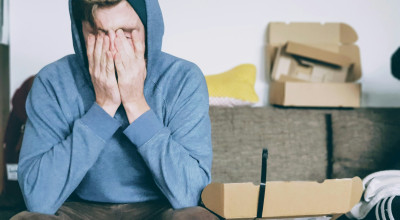The Effects of COVID-19 on Mental Health and Addiction
June 30th, 2020
The impact on mental health from the novel coronavirus (or COVID-19) is heavily understated in the media, the news, and really in general. We’ve discussed a little bit in a past blog that isolation is causing a rise in relapses, but the coronavirus pandemic goes beyond being stuck at home more than you’re used to. Social isolation is a big part of the overall struggle of COVID-19, but there are more than a few factors to consider.
According to a health tracking poll by the Kaiser Family Foundation, 45% of American adults report stress and worry directly related to the impact of coronavirus on their lives. In particular, the poll found a skew towards older individuals and those with a family containing adolescents due to heightened health risks.
Loss of Security
Mental health can be affected by any number of factors, sometimes seemingly from nowhere. Most commonly, mental health can take a clear and direct hit when things we need are threatened or taken away from us. The coronavirus pandemic damages our perceived security and safety, one of our core survival instincts. When we can’t fulfill our baseline needs as humans, mental health will follow quickly as a response.
The loss of security goes beyond the physical threat of the COVID-19 pandemic. It comes in many forms: income insecurity, familial insecurity, and even employment insecurity. People are losing jobs or putting themselves at risk in the workplace if marked as an essential worker, and coming home to others who may be doing the same. When other jobs are not hiring, and people aren’t in the financial position to quit their current employment, damage to mental health is inevitable for most. Job loss is proven to be associated with anxiety, depression, low self-esteem. It may even lead to higher rates of substance abuse. This trend becomes increasingly true for lower-income populations than those fortunate enough to live in a more privileged bracket.
Sheltering in Place
Those who are fortunate enough to be able to work from home face a different kind of problem: quarantine. Those who choose to respect scientist recommendations to remain in place are spending the vast majority of their time at home, save for occasional bits of essential travel like grocery shopping. Social isolation and loneliness have already been linked to depressive behaviors and conditions in the past, and a pandemic brings no exception to this trend. Even essential workers are not spending time with their friends and family unless they live with them already. Social isolation is a burden on mental health, especially when paired with safety concerns over a long period.
When we’re in isolation, a routine can become severely restricted by what’s in our home. Half of the day is spent on the computer for work, possibly more if you spend your recreational time online as well. When we go to work in person, we at least have the benefit of spending time in a different building around different people. This schedule helps build a sense of relaxation and restfulness around your home that will allow your brain to take the daily break that it needs. If you’re one of the people spending most of your time at home, make sure your regular schedule allows time for new things and opens your brain a little bit of new stimulation each day.
Addiction and Substance Abuse During Coronavirus
With America having just over 20 million people suffering from addiction, there are many who were relying on professional or group-based therapy services to help keep substance abuse in check. Fortunately, organizations and professionals are doing everything in their power to expand their network of support to be used from home. Telemedicine, phone consultations, and Zoom group meetings are all examples of the ways treatments are being transferred to other platforms.
There are several implications of the dangers of addiction during a pandemic. Namely, the physical threat of coronavirus impacting the lungs most significantly. Those who engage in regular use of tobacco, marijuana, inhaled opiates, and methamphetamines are increasingly vulnerable to the damaging effects of COVID-19. Additionally, when somebody is addicted, they will likely engage in using inhalants while afflicted too. Usage while sick is likely damaging for the respiratory and pulmonary systems both in the short and long term.
The lack of effective treatment options, physical danger, quarantining for long periods, and societal changes are a lot to keep up with for even someone not facing addiction. All of these drastic changes equate to stress. Research indicates people experiencing stress are more likely to engage in abuse of alcohol, inhalants, and other drugs to relieve stress. When all factors of the virus are considered, it’s possible to put into perspective why the pandemic is a challenging time for those both addicted and engaging in the process of recovery.
Final Thoughts and Recommendations
The coronavirus is concerning for everyone (or at least, it should be). Those who are in a reasonable position to remain at home will need to do so in order to allow treatment options and other common facilities to re-open again. The recent re-closure of bars is an indication that patience and hard work is going to be necessary to return to a safe level of “normal” again. The hardships of quarantining should be acknowledged so we can understand how to best treat ourselves and others who are struggling, and not be a reason to ignore expert recommendations.
If you or someone close to you is suffering from severe depression or dangerous substance abuse, contact a professional. Though limited primarily to online options, emergency or high priority treatment is almost always available. A pandemic undoubtedly makes it more challenging to find proper help, but it is not a reason to standby when you or someone else is suffering.


